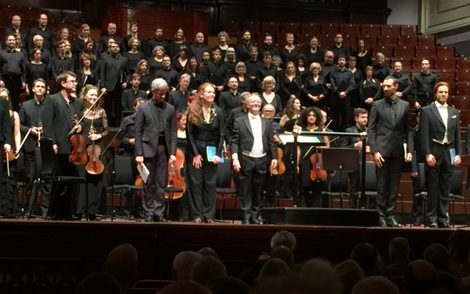Scotland’s best classical music critic, Mike Tumelty of the Herald, reckons the Scottish Chamber Orchestra may be Scotland’s finest orchestra. Their cellist Su-a Lee gives such joy in her music, making it is a delight to watch her. It is also always interesting to see what colour her hair is this week!
Indeed, the SCO generally give the impression of enjoying their music – something that isn’t always apparent in some famous orchestras! So this performance of Berlioz’s L’Enfance Du Christ with four singers and the SCO Chorus at the Usher Hall is a disappointment, partly, one suspects, because the work itself is rather clunky or bitty and doesn’t flow smoothly. Berlioz wrote it in several parts over some years which may explain it.
However, the distinguished visiting conductor Emmanuel Krivine doesn’t help in his conducting, and with the movements on and off the stage of the orchestra and the chorus, it creates a very uneven experience for the listener and the viewer. Also, very unusually, Krivine got the chorus to repeat the most famous music in the work – The Shepherd’s Chorus. He says it is because it is so beautiful that he thinks we should hear it again. However, he may be thinking it had been slightly fluffed in its first performance. It certainly sounds better the second time round!
Repeating parts of concerts or arias used to be done on a routine basis when I first started attending opera some 50 years ago. Indeed, I well remember the great Welsh baritone Geraint Evans regularly repeating his favourite arias at Covent Garden. It is rarely done these days in opera houses, not least because it breaks up the dramatic line of the opera, and today drama is now taken more seriously. Although L’Enfance Du Christ isn’t an opera, it is trying to tell a story, perhaps one of the greatest biblical stories. So while repetition may please the conductor, it certainly confuses the audience.
It is a very French evening, as is of course right – Berlioz was one of France’s greatest composers and Emmanuel Krivine is one of France’s leading conductors. Indeed, he is soon taking over the National Orchestra. The soloists are largely French, but are not all of the highest quality. The narrator Bernard Richter is a superb clear tenor whose words ring out across the Usher Hall. The bass Jerome Varnier, who sings Herod, has a lovely, mellifluous voice but his diction isn’t as clear. The baritone Edwin Crossley-Mercer is adequate, but the soprano Christianne Stotjin, who sings Mary, is the weak link. She struggles at times to reach the notes.
The Scottish Chamber Chorus sings well overall but it’s hard to understand why they have to troop off and on the stage during the work. Again, it interrupts the flow of the music. The Orchestra themselves play as well as usual, although Berlioz didn’t help by throwing in a little trio towards the end of the work.
Of course, in between these interruptions there is some lovely music and some fine singing, both by the soloists and the chorus. However, overall, the evening is somewhat disappointing, although, as one very knowledgeable musical friend says, ‘don’t blame the musicians – blame the composer!’
